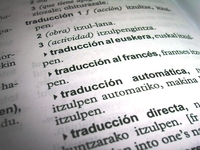Towards a European Master's in Translation

EU Commission launches cooperation with universities in translator training. On 19 and 20 October, 2006, the European Commission's Directorate-General for Translation (DGT) hosted in Brussels its first ever conference with universities offering a translation curriculum.
Experts from all EU Member States plus Bulgaria and Romania, representing around 70 higher education institutes involved in translation teaching, as well as international organisations (UN, NATO, OECD among others) and professional associations, have been invited to the conference "Towards a European Master's in Translation (EMT)". They discussed the development of translator training in the EU. The conference has been a first step towards a standard curriculum for a Master's degree in translation within the EU. This is also one of the actions put forward in the Commission Communication on Multilingualism which are aimed at promoting multilingualism in the EU.
Commenting on this event, Ján Figeľ, Commissioner for Education, Training, Culture and Multilingualism said: "This conference is an innovative way to promote multilingualism since it will improve networking among universities collaborating as part of the European Master's in Translation and enhance our dialogue with them".
The purpose of the EMT conference is to:
- promote multilingualism by strengthening DGT's ties with universities involved in translation research and teaching;
- promote the development of a European Master's in Translation curriculum among the key universities in the EU Member States and acceding countries;
- create a network of universities and other experts to collaborate in the framework of the EMT;
- enhance dialogue with the universities and encourage them to develop their teaching programmes in line with the EMT standard curriculum proposed by DGT.
The proposed standard curriculum can be adopted by universities wishing to participate in the EMT project. The Commission provides advice, but the responsibility for the translator training rests exclusively with the universities.
The EMT degree is meant to be an intensive programme lasting one to two years and open to all university graduates. It should focus primarily on the translation component, and not on the language skill/language acquisition aspect of the training. The programme is, however, flexible in order to take into account the requirements of the European institutions, including the need for specialists in a number of policy areas with language skills, as well as specific national conditions and developments in the translation profession.
The need to establish a standard comparable curriculum for a Master's degree in translation in Europe became a crucial issue with the 2004 enlargement when the Commission faced some difficulties in recruiting translators in several of the new official EU languages. The main objective is to produce highly qualified translators with all the basic skills required of a professional translator who could be employed both by the national market and by the EU institutions.
The conclusions of the conference will provide a basis for an action plan suggesting further steps towards a European Master's in Translation.
For more information on the conference:
http://ec.europa.eu/dgs/translation/events/emt2006/index_en.htm
For more information on DGT and languages:
http://ec.europa.eu/dgs/translation/index_en.htm
http://europa.eu/languages/en/home



